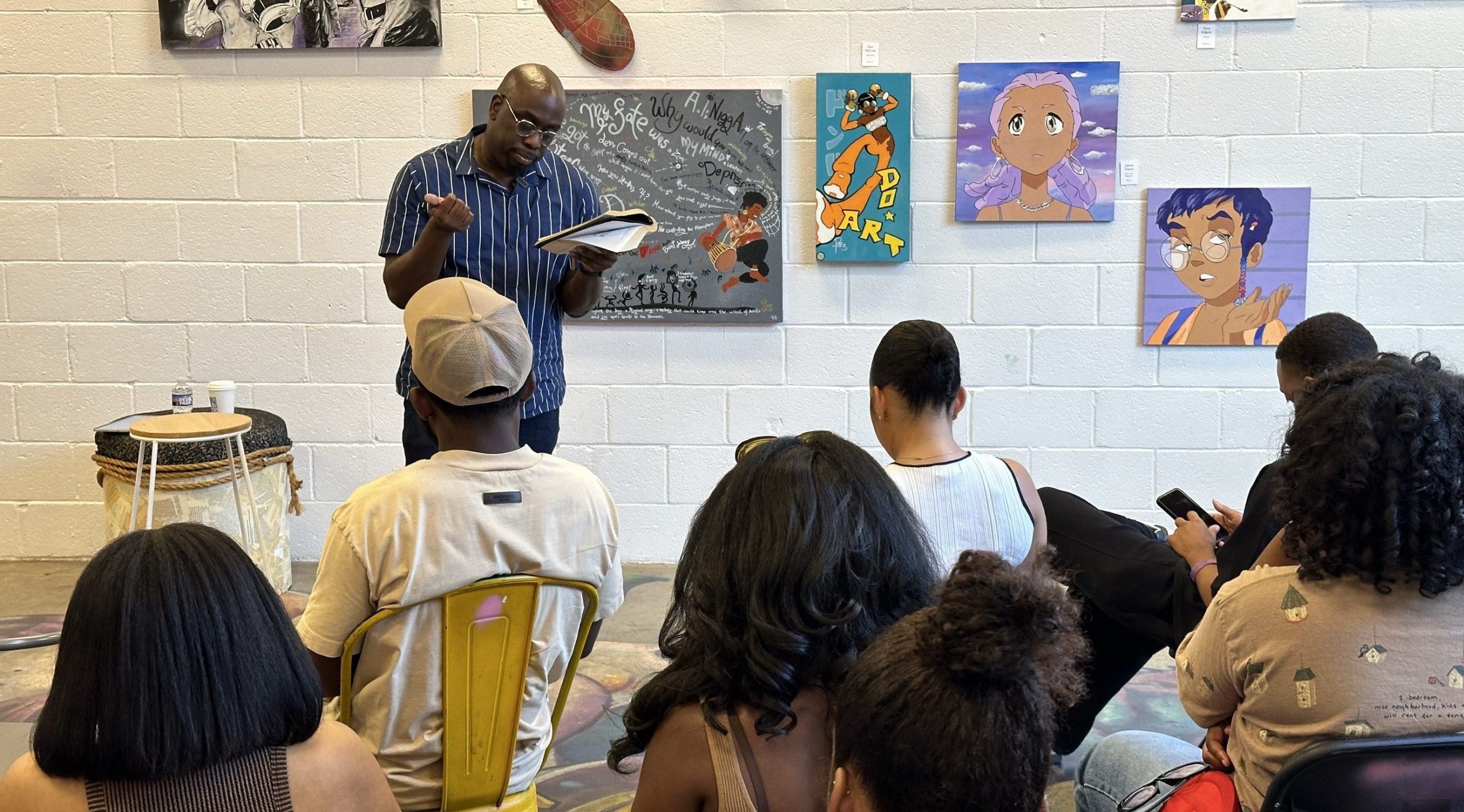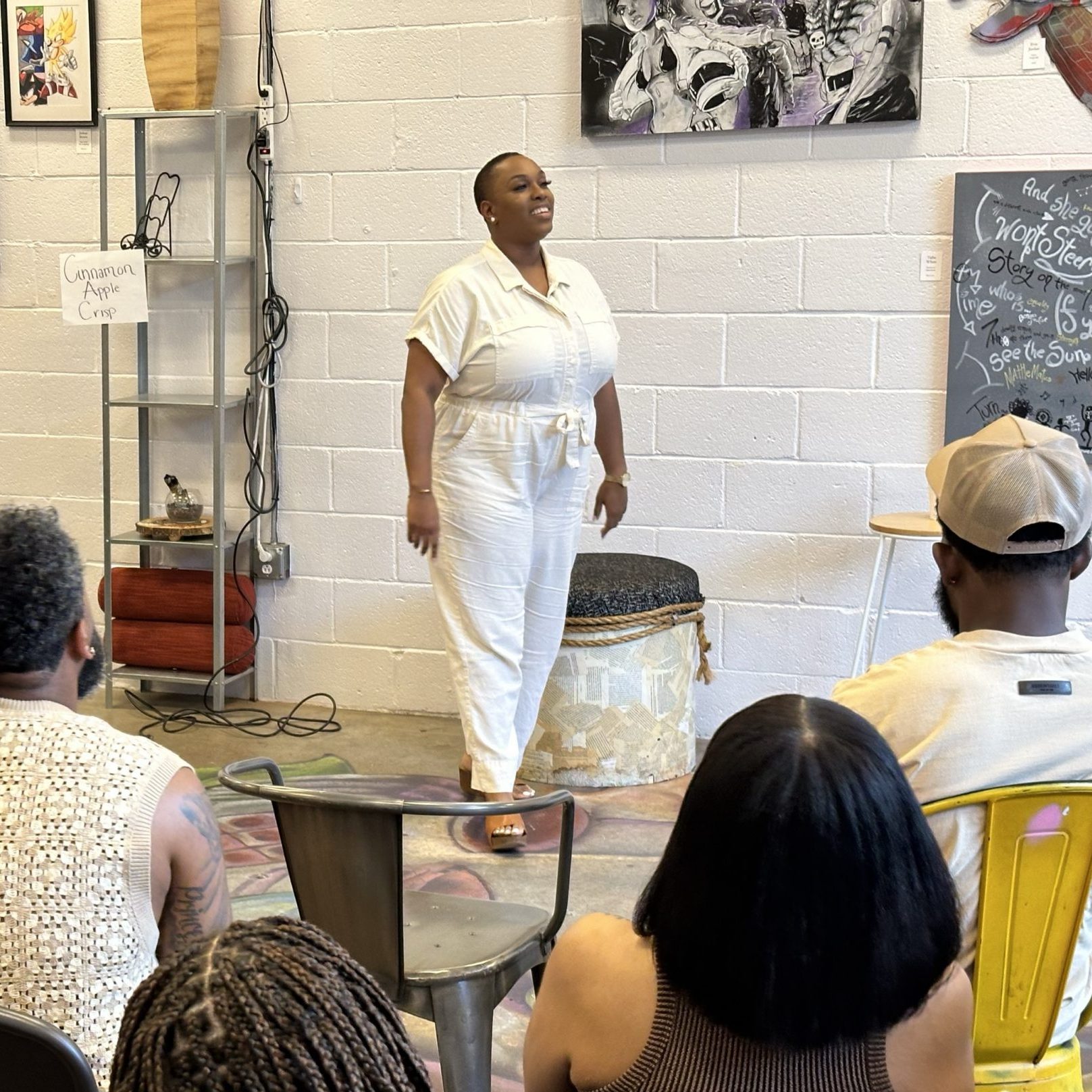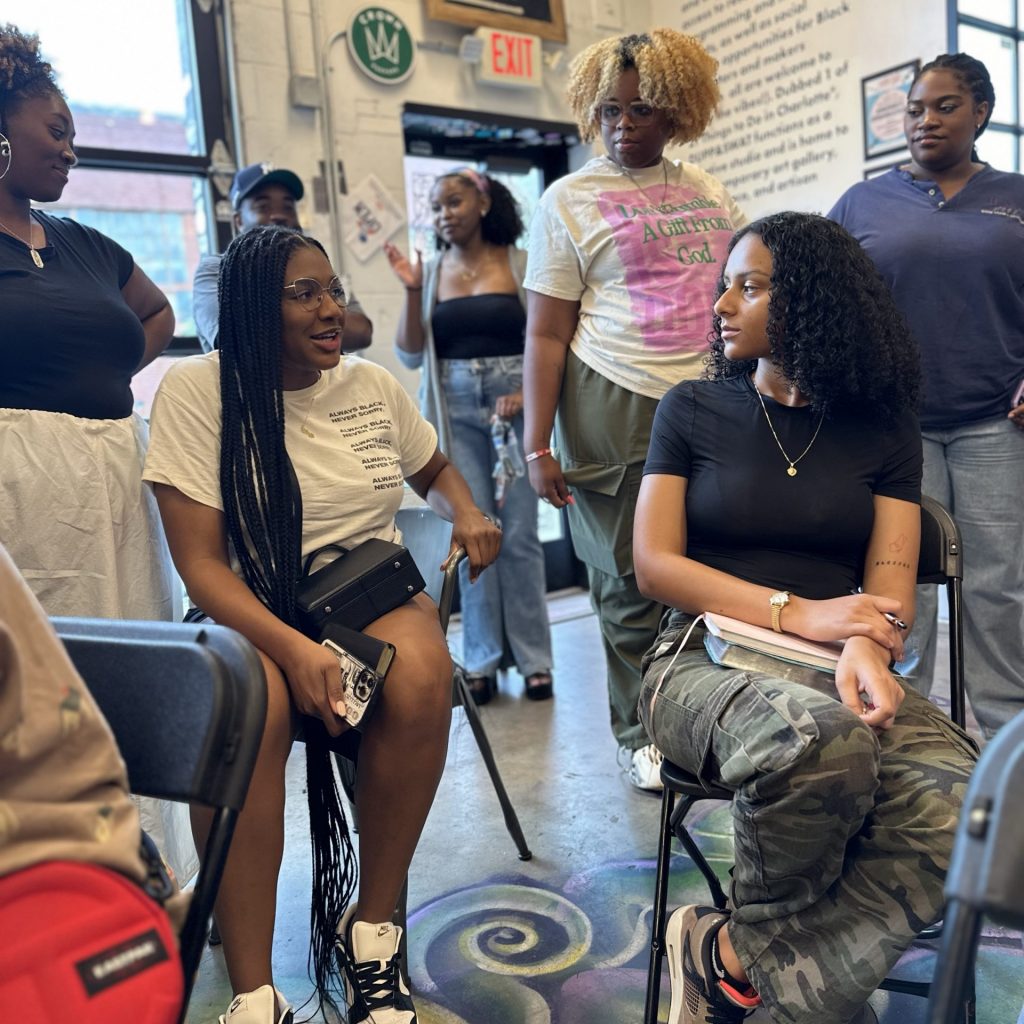
What’s Working: The Place
This post continues our series to showcase our learnings in a multi-year campaign titled What’s Working, a Lilly Endowment Inc.– supported project to discover how faith-based organizations are working to engage Gen Z. Over the course of 2024, we’ll visit organizations across the country that are revamping traditional methods and innovating new ways to connect with and support the flourishing of young people. Here, we showcase The Place, a gathering designed for young people to “experience God in a different way.”
On a Sunday evening, only standing room remains at Dupp and Swat, an event space on Charlotte’s north side. The attendees, predominantly African Americans under age 40, occupy chairs neatly arranged in rows facing the front. One person stands to deliver a testimony. Another comes to the front to offer a song, and it’s a familiar one. The audience sings, sways, and waves their hands. Then a man comes forward, Bible in hand, and dives headfirst into a sermon on the transitions of life. On the surface, it feels like church, without the pews and the pulpit.
And then something unusual happens. During the middle of the sermon, a woman raises her hand to ask a question. The man stops preaching and calls on her, much more in the style of a classroom than a church. The woman shares her thoughts and expresses her difficulty in being able to model in real life the behavior the man is talking about. Nods and audible sounds from the audience signal their agreement. In a second, the space shifts from one of monologue to dialogue, creating the air of transparency and vulnerability for which The Place has become known.

Trevor Beauford, a former youth pastor and college chaplain, founded The Place after feeling led to create a community where people who’d experienced hurt in church could feel safe connecting with God and others. Trevor knew he wanted a group of young people alongside him to help him shape the experience. In the initial planning, one thing became clear: They did not want to call it church.
“[Our young leaders and attendees, many of whom attend other churches] don’t want to invite their friends to church. They want to invite their friends to a spiritual space that they know is safe,” Trevor says. “Being a safe spiritual community is important to them. And the word church sometimes feels so unsafe because we have had Church models that were judgy, and we have had Church models that were harmful, Church models that were abusive. We have all these things wrapped up in this word church, which is completely antithetical to what the Jesus church word is, but that’s just who we are. And so because of that, they’re like, no. And because it comes with layered language, there are people who will not come to church but will come to The Place.”
Sterling Jones, 28, one of the young adults who comprise the leadership team for The Place, describes it as “an open spiritual space of worship for you just to come and learn and hear about God in a different way with your peers and come as you are.”
“It’s a little different from your typical idea of church and what you would imagine it to be as far as the infrastructure of it. . . . With The Place, we move around to different locations,” Sterling says. “But the thing that remains the same is [the delivery of] a message for anyone, and everyone that’s open to at least hearing a piece of it and taking that and making it applicable to their own life. Trevor does a good job of storytelling in a way that young people and older people understand what he’s saying and can apply it.”


The Place launched in December 2022. Since then, the leadership team has experimented with their worship design, allowing the needs of the community to guide their planning.
“There are days I don’t talk. There are days we have panels,” Trevor says. “There are days we sing a lot. There are days we don’t sing at all. We build it month by month based on what we believe the season is for the folks. I ask my team all the time, ‘What’s going on?’ We don’t plan in a vacuum. I am like, ‘Hey, so tell me, What are your friends talking about? What’s on your heart and mind?’ And then we try to build it out.”
Trevor approaches ministry with young people as “doing ministry with,” not “to” or “for.” This includes having a flat table—a leadership style where hierarchal power structures are set aside so everyone has a voice and a vote. He believes every young person has gifts and talents; his job is to create an environment where young people can flourish in leadership.
“I believe ‘doing ministry with’ means that we are in community together, we wrestle with heart together, and we do ministry together—flat table—versus a lot of institutions that do ‘ministry for.’ ‘Oh, we have a youth night or we have a young adult night for them’ . . . that means you did it for them. You didn’t ask them. Or the ministry too—we’re going to tell you what to do for your spiritual development. Doing ‘ministry with’ is super hard. It means you have to listen and get pushback and recognize generational changes and things. There are things that I love that they don’t like, and sometimes it’s really hard when they tell me no, but sometimes it isn’t because we’re in this together.”
Trevor now serves as a faith organizer with the Children’s Defense Fund in Washington, DC, so the leadership team handles most of The Place’s operations. Stepping more fully into leadership has had its challenges, but it has also offered a space to develop in new ways.
Leadership team member Matthew Powell, 27, says he’s empowered by the flat table approach: “If it’s more hierarchical and you’re being delegated to, you may not have the courage to speak up to share your ideas. So when the table is flat . . . you’re able to speak up about the ideas that you have that can contribute to the overall experience.” Leadership team member Maya Hood, 26, shares similarly that she appreciates being a “cocreator instead of just executor.”
Leadership team member Courtney Smith, 26, says she can see The Place’s offering resonating with her friends and others her age who were raised in church but didn’t feel like they had a spiritual space for themselves as young adults, especially post-pandemic.
“People are graduating, trying to get connected with work and establish who they are outside of being a teenager and kind of transitioning into the young adult space,” Courtney says. “So for me, I think when my friends were coming to me and saying how much they appreciated and really cherished the opportunity to connect and meet people and find a space where they felt welcome and able to share, that’s when I knew that we were doing something that was pretty incredible to me.”



